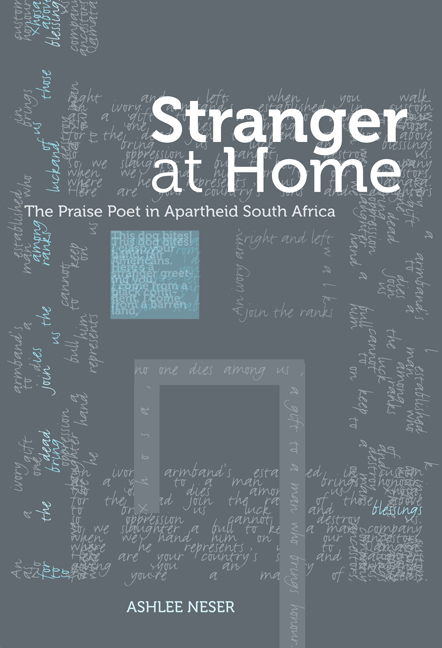Introduction
Published online by Cambridge University Press: 17 May 2019
Summary
In an obscure volume of Xhosa poetry entitled Inguqu (‘A Return to the Attack’), written by David Yali-Manisi and published in 1954, there appears a praise poem addressed to Chief Rolihlahla Nelson Mandela, a young Thembu chief who would become South Africa's first democratically elected president 40 years after Manisi wrote him into poetry. Part character summation, part prophecy and exhortation, Manisi's izibongo, or praise poem, for Mandela precedes its subject's transformation into the major symbol around which anti-apartheid commitment would mobilise, and anticipates his future international importance. Although the poet identifies his subject as a royal chief, Manisi places Mandela in an African context of widespread upheaval, and praises him for his service to African groups within and beyond South African borders:
You've rendered services to Mbo and Nguni,
to Sotho and Tswana,
to Senzangakhona's Zulu,
to Swazi and Ndebele,
to Shona, Nyasa, Kalanga;
you've bridged nations great and small,
forging African unity:
all its nations are gripped in one birth pang. (71–72)
As well as addressing Mandela with his traditional salutation, ‘Hail, Earth Tremor!’, Manisi creates a new and prophetic name for his chief, ‘Gleaming Road’, which predicts Mandela's future influence:
Hail, Mandela's gleaming road!
Nations name you Earth Tremor;
the poet names you Gleaming Road:
you set Africa blazing … (72)
Manisi suggests no contradiction in honouring his subject as a Thembu chief who is destined to cast off the signs of custom in order to transcend his Thembu identity. The poet observes:
Piercing needle,
handsome at Mthikrakra's home,
ochre-daubed torso,
Mandela's son.
Beads and loincloths become him,
Though ochre becomes him he spurns it:
If he'd used it, what might have happened? (72)
Beads, loincloths and ochre are the outward symbols of traditional identity and indicate participation in local codes and customs. Mandela is beautiful when adorned in the costume of his rural community, yet there is value in his refusing ochre, the sign of ‘Red’ identity whose wearers spurn outside groups.
- Type
- Chapter
- Information
- Stranger at HomeThe Praise Poet in Apartheid South Africa, pp. 1 - 32Publisher: Wits University PressPrint publication year: 2011



